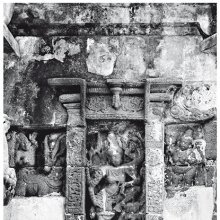Vateshvara, Vateśvara, Vaṭeśvara: 5 definitions
Introduction:
Vateshvara means something in Hinduism, Sanskrit. If you want to know the exact meaning, history, etymology or English translation of this term then check out the descriptions on this page. Add your comment or reference to a book if you want to contribute to this summary article.
The Sanskrit terms Vateśvara and Vaṭeśvara can be transliterated into English as Vatesvara or Vateshvara, using the IAST transliteration scheme (?).
Images (photo gallery)
In Hinduism
Purana and Itihasa (epic history)
Source: Cologne Digital Sanskrit Dictionaries: The Purana IndexVateśvara (वतेश्वर).—With Mādhava is engaged in Yoganidrā at Prayāgā;1 the holiest of holies;2 the Prapitāmaha or Viṣṇu.3

The Purana (पुराण, purāṇas) refers to Sanskrit literature preserving ancient India’s vast cultural history, including historical legends, religious ceremonies, various arts and sciences. The eighteen mahapuranas total over 400,000 shlokas (metrical couplets) and date to at least several centuries BCE.
Jyotisha (astronomy and astrology)
Source: academia.edu: VatesvaraVaṭeśvara (वटेश्वर), son of Mahādatta Bhaṭṭa, was a tenth-century Indian astronomer from a town in the Kashmir valley. Some accounts name Ānandapura as the place of his birth. He is the author of the Vaṭeśvara Siddhānta, which he completed at the age of twenty-four, in 904 CE (Śaka 826).
Vaṭeśvara was an Āryabhaṭan by persuasion, and adopted several stances taken by the great pioneer. For instance, most astronomers divide the Mahāyuga of 43,20,000 years into the four yugas, the Kṛta, Tretā, Dvāpara and Kali in a 4:3:2:1 ratio. But Vaṭeśvara followed Āryabhaṭa and assigned a period of 10,80,000 each for the four yugas. In doing so, he made a strong attempt to refute Brahmagupta’s criticism of Āryabhaṭa.

Jyotisha (ज्योतिष, jyotiṣa or jyotish) refers to ‘astronomy’ or “Vedic astrology” and represents the fifth of the six Vedangas (additional sciences to be studied along with the Vedas). Jyotisha concerns itself with the study and prediction of the movements of celestial bodies, in order to calculate the auspicious time for rituals and ceremonies.
Languages of India and abroad
Sanskrit dictionary
Source: Cologne Digital Sanskrit Dictionaries: Aufrecht Catalogus Catalogorum1) Vaṭeśvara (वटेश्वर) as mentioned in Aufrecht’s Catalogus Catalogorum:—father of Pakṣadhara Miśra (Tattvanirṇaya). L. 1845.
2) Vaṭeśvara (वटेश्वर):—poet. [Sūktikarṇāmṛta by Śrīdharadāsa]
3) Vaṭeśvara (वटेश्वर):—son of Gaurīpati or Gaurīśvara: Mudrāprakāśa Mudrārākṣasaṭīkā.
Source: Cologne Digital Sanskrit Dictionaries: Monier-Williams Sanskrit-English Dictionary1) Vaṭeśvara (वटेश्वर):—[from vaṭa > vaṭ] m. Name of a Liṅga, [Rājataraṅgiṇī]
2) [v.s. ...] of a poet and of various other men, [Catalogue(s)]
[Sanskrit to German]
Sanskrit, also spelled संस्कृतम् (saṃskṛtam), is an ancient language of India commonly seen as the grandmother of the Indo-European language family (even English!). Closely allied with Prakrit and Pali, Sanskrit is more exhaustive in both grammar and terms and has the most extensive collection of literature in the world, greatly surpassing its sister-languages Greek and Latin.
See also (Relevant definitions)
Starts with: Vateshvaradatta, Vateshvaramahatmya, Vateshvarapura, Vateshvarasiddhanta, Vateshvaratirtha.
Ends with: Amavateshvara, Parvateshvara.
Full-text: Gauripati, Vateshvaramahatmya, Vateshvarasiddhanta, Prithu, Vateshvaradatta, Nayalocana, Nayasara, Pakshadhara mishra, Vateshvarapura, Mudrarakshasa, Madhava.
Relevant text
Search found 9 books and stories containing Vateshvara, Vateśvara, Vaṭeśvara, Vatesvara; (plurals include: Vateshvaras, Vateśvaras, Vaṭeśvaras, Vatesvaras). You can also click to the full overview containing English textual excerpts. Below are direct links for the most relevant articles:
Garga Samhita (English) (by Danavir Goswami)
Verses 3.10.31-37 < [Chapter 10 - The Glory of Śrī Girirāja]
The Skanda Purana (by G. V. Tagare)
Chapter 40 - Eminence of Kāmeśvara (Kāma-īśvara) < [Section 3 - Arbuda-khaṇḍa]
Chapter 56 - Greatness of Sāṃbāditya < [Section 1 - Tīrtha-māhātmya]
Chapter 35 - Greatness of Agni Tīrtha < [Section 1 - Prabhāsa-kṣetra-māhātmya]
Dasarupaka (critical study) (by Anuru Ranjan Mishra)
Part 1 - Viśākhadatta—Author of the drama (Mudrārākṣasa) < [Chapter 1 - Nāṭaka (critical study)]
Part 16 - Conclusion < [Chapter 1 - Nāṭaka (critical study)]
The Siva Linga: Conceptual, Iconographical and < [January – March, 1996]
The Shiva Purana (by J. L. Shastri)
Chapter 2 - The greatness of Śivaliṅgas < [Section 4 - Koṭirudra-Saṃhitā]
Historical Elements in the Matsya Purana (by Chaitali Kadia)
The Pilgrimages in the Matsya Purāṇa < [Chapter 4 - Geographical history in the Matsya-Purāṇa]
Related products

